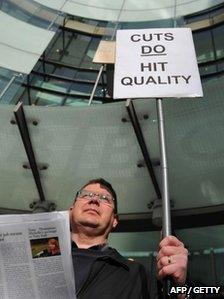BBC journalists strike over redundancies
- Published

NUJ members at the BBC were balloted before Christmas
Many BBC journalists have completed a 24-hour strike in a dispute over compulsory redundancies.
The National Union of Journalists said it called the strike after failing to reach an agreement with management.
The disagreement was over the redeployment of 30 staff members facing compulsory redundancy.
The flagship Today programme on BBC Radio 4 was dropped from the schedule, replaced by repeats and short news summaries on the hour.
On television, BBC Breakfast was broadcast from London by a single presenter instead of its regular Salford hosts.
The usual programme was replaced with a 30-minute bulletin on the hour, followed by daytime programmes including Cash in the Attic and Escape to the Country.
On Radio 5 live, the overnight Up All Night programme and Morning Reports were dropped, while Radio 4 news programmes The World At One, The World Tonight and PM were all affected.
The BBC press office ran a webpage with rolling updates of affected programmes and changes to the schedule.
'Angry and frustrated'
The corporation is cutting about 2,000 jobs over five years as part of its Delivering Quality First programme.
Most of the 2,000 redundancies are expected to be as a result of natural wastage and a freeze on recruitment, but the NUJ said 30 compulsory redundancies were being disputed.
Nine of the 30 jobs are at BBC Scotland, where management have been accused of taking an "entrenched" position.
Compulsory redundancies have also been threatened at 5 live, the Asian Network and the World Service.
NUJ general secretary Michelle Stanistreet said: "NUJ members across the BBC are taking action to defend jobs and quality journalism at the corporation.
"They are angry and frustrated at the poor decisions being taken at the top of the BBC - decisions that are leading to journalists being forced out of their jobs and quality journalism and programming compromised."
She said: "Instead of making sure that the redeployment process works properly in all areas of the BBC, managers are prepared to waste public money on needless redundancies and sacrifice the livelihoods of experienced and talented journalists, at the same time as advertising other jobs externally."
A BBC spokesman apologised for the disruption to services and said the corporation was "disappointed" with the strike.
Many BBC journalists are on strike in a dispute over compulsory redundancies
"Unfortunately industrial action does not alter the fact that the BBC has significant savings targets and as a consequence may have to make a number of compulsory redundancies," the spokesman said.
"We have made considerable progress in reducing the need for compulsory redundancies through volunteers, redeployment and cancelling vacant positions and we will continue with these efforts."
- Published4 February 2013
- Published15 July 2011
- Published6 October 2011
- Published6 October 2011
- Published5 November 2010